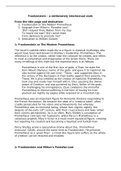Frankenstein – a deliberately intertextual work
From the title page and dedication:
1. Frankenstein or The Modern Prometheus
2. Epigraph from Milton’s ‘Paradise Lost’:
‘Did I request thee, Maker, from my clay
To mould me man? Did I solicit thee
From darkness to promote me?’
3. Dedication to William Godwin
1: Frankenstein or The Modern Prometheus
The novel’s subtitle refers explicitly to a figure in classical mythology who
would have been well-known to Shelley’s readership: Prometheus. The
reference is to the creator, rather than the creature he creates, and refers
to most accomplished and imaginative of the Greek titans. There are
many re-tellings of this myth but the essential story is as follows:
Prometheus is one of the first race of gods, a Titan; he stole fire
from Mount Olympus, home of the gods, and gave it to mankind. He
also turned against his own kind – Titans – and supported Zeus in
the victory of the Olympians in their battle against their parents, the
Titans. He is also credited as the creator of mankind: Prometheus
took clay and made man himself with it, thus usurping the divine
power of Creation, and was punished by Zeus, father of the gods.
For challenging his omnipotence, Zeus condemns the immortal
Prometheus to eternal suffering in the form of having his liver
plucked out nightly by eagles while exposed on a mountain top.
Prometheus was an important figure for Romantic thinkers responding to
the French Revolution. He became the ideal of a ‘creative rebel’, often
cruelly persecuted for his vision and achievements, but whereas
Prometheus was an immortal being, whose liver regrew nightly, the
despots of the early 19th century, with their cruel prisons and laws, killed
their victims permanently. As is so often, Mary Shelley’s conception of
Prometheus contrasts her husband’s; whilst Percy’s Prometheus is a
victorious prophet, Mary’s Victor is a much more equivocal figure, creating
but rejecting his creation and becoming a haunted and hunted man.
Percy Shelley wrote a speculative drama about this, ‘Prometheus
Unbound’ (1818), around the same time as Frankenstein. He presents
Prometheus as a ‘good Titan’, a Christ-like figure who suffers so the whole
of creation can be restored and enabled.
2: Frankenstein and Milton’s Paradise Lost





